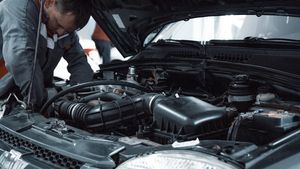Cordless Tools 2025: Which Battery System to Choose?
Complete comparison of battery systems from Makita, DeWalt, Bosch, Milwaukee and others. We'll help you choose the best ecosystem for your needs.

Choosing the right cordless tool system is one of the most important investments for every DIY enthusiast or professional. Once you choose a brand, you'll likely stick with it for years. Let's analyze the major market players in detail for 2025.
Major Battery Systems
Makita LXT 18V
Ecosystem:
- 275+ tools
- Widest selection on the market
- Compatibility across entire range
Battery Technology:
- 1.5 Ah to 6.0 Ah standard
- BL1860B with indicator
- Fast charging in 25-55 min
Advantages:
- Huge tool selection
- Availability in rental shops
- Quality Japanese manufacturing
- Reasonable prices
Disadvantages:
- Conservative innovation
- Heavier batteries
- More expensive large batteries
DeWalt 18V XR / FlexVolt
Ecosystem:
- 200+ 18V tools
- FlexVolt 54V/18V system
- PowerStack technology
Battery Technology:
- XR Li-Ion 2.0-12.0 Ah
- FlexVolt voltage switching
- PowerStack - thinner batteries
Advantages:
- FlexVolt versatility
- Powerful tools
- American tradition
- Bluetooth batteries
Disadvantages:
- Higher price
- Heavy FlexVolt batteries
- Less compact
Bosch Professional 18V
Ecosystem:
- 150+ tools
- ProCore batteries
- AMPShare alliance
Battery Technology:
- Standard 2.0-6.0 Ah
- ProCore 4.0-12.0 Ah
- Cool pack technology
Advantages:
- German quality
- AMPShare compatibility
- Compact design
- Biturbo motors
Disadvantages:
- Smaller ecosystem
- Higher prices
- Fewer innovations
Milwaukee M18 Fuel
Ecosystem:
- 250+ tools
- One-Key technology
- Widest power range
Battery Technology:
- RedLithium 2.0-12.0 Ah
- High Output versions
- 21700 cells
Advantages:
- Most powerful tools
- One-Key tracking
- Innovative solutions
- Long runtime
Disadvantages:
- Premium prices
- Heavy HO batteries
- Aggressive marketing
Comparison Table
| Brand | Tool Count | 5Ah Battery Price | 5Ah Charging | Warranty | Special Features |
|---|---|---|---|---|---|
| Makita | 275+ | $88 | 45 min | 3 years | Star Protection |
| DeWalt | 200+ | $100 | 60 min | 3 years | FlexVolt, Bluetooth |
| Bosch | 150+ | $96 | 45 min | 3 years | AMPShare, CoolPack |
| Milwaukee | 250+ | $112 | 60 min | 3 years | One-Key, RedLink |
| Ryobi | 100+ | $60 | 90 min | 3 years | Lifetime warranty* |
| Metabo | 120+ | $92 | 30 min | 3 years | LiHD, Ultra-M |
*On batteries with registration
New Technologies 2025
1. Pouch Cell Batteries
DeWalt PowerStack:
- 50% smaller volume
- 25% lower weight
- Better heat dissipation
- Higher performance
Disadvantages:
- Limited capacity so far
- Higher price
- Less durable?
2. 21700 Cells
Milwaukee High Output:
- 50% more energy
- Higher current capacity
- Longer lifespan
- Faster charging
Used in:
- Milwaukee M18 HO
- Makita XGT 40V
- Some e-bike batteries
3. Smart Batteries
Features:
- Bluetooth monitoring
- GPS tracking
- Condition diagnostics
- Charging optimization
Available from:
- DeWalt (selected models)
- Milwaukee One-Key
- Festool (premium)
AMPShare Alliance
Revolutionary brand collaboration:
Members:
- Bosch Professional
- Fein
- Rothenberger
- Wagner
- Steinel
- and others...
Advantages:
- One battery, multiple brands
- Specialized tools
- Cost savings
- Less electronic waste
Specialty Systems
Festool 18V
For whom:
- Professional carpenters
- Premium segment
- Systainer organization
Price: 3-4x higher than competition
Metabo LiHD
Specialties:
- Fastest charging
- 3-year free warranty
- Robust construction
- Made in Germany
Ryobi ONE+
For whom:
- Hobby DIY enthusiasts
- Occasional use
- Limited budget
- Garden equipment
Cost/Benefit Analysis
Scenario: Home Workshop Equipment
Basic Needs Set:
- Drill/driver
- Angle grinder
- Jigsaw
- Flashlight
- 2x 5Ah batteries
- Charger
Price Comparison:
| Brand | Tool Price | Batteries+Charger | Total |
|---|---|---|---|
| Makita | $480 | $220 | $700 |
| DeWalt | $540 | $240 | $780 |
| Bosch | $520 | $232 | $752 |
| Milwaukee | $600 | $260 | $860 |
| Ryobi | $320 | $140 | $460 |
ROI Calculation
Professional Use (250 days/year):
- Premium tools: $860
- Time savings: 30 min/day
- Hourly rate: $30
- Annual savings: $3,750
- ROI: 3 months
Hobby Use (50 days/year):
- Mid-range: $700
- Savings vs. rental: $35/day
- Annual savings: $1,750
- ROI: 5 months
How to Choose the Right System
1. By Usage Type
Professional:
- Milwaukee or Makita
- Focus on power and runtime
- Wide ecosystem
- Service network
Advanced DIY:
- DeWalt or Bosch
- Balanced price/performance
- Quality basic tools
- Growth potential
Occasional DIY:
- Ryobi or Einhell
- Affordable price
- Basic functionality
- Wide availability
2. By Specialization
Carpenter:
- Festool (if you can afford it)
- Makita (reasonable choice)
- Bosch (AMPShare advantage)
Plumber:
- Milwaukee (M12+M18)
- Rothenberger (AMPShare)
- Ridgid (lifetime warranty)
Electrician:
- Milwaukee (compact M12)
- DeWalt (wide selection)
- Wiha (speedE)
3. By Budget
Under $800:
- Ryobi ONE+
- Einhell Power X-Change
- Worx PowerShare
$800 - $1,600:
- Makita LXT
- Bosch Professional
- Metabo
Over $1,600:
- Milwaukee Fuel
- DeWalt FlexVolt
- Festool
Tips for Maximum Battery Life
Storage:
- 40-60% charge
- Temperature 50-77°F
- Dry environment
- Outside of tools
Charging:
- Don't let discharge to 0%
- Use original chargers
- Ventilate during charging
- Don't charge frozen
Usage:
- Rotate batteries
- Don't overload
- Clean contacts
- Monitor temperature
Future of Cordless Tools
Trends 2025-2030:
Solid-state Batteries:
- 2x higher capacity
- Faster charging
- Longer lifespan
- Higher safety
Voltage Unification:
- More 18V/20V max
- Fewer proprietary systems
- Greater compatibility
IoT Integration:
- Predictive maintenance
- Fleet management
- Automatic ordering
- Tool sharing
Conclusion
Choosing a battery system is a long-term investment. Consider your current and future needs, budget, and type of work. For professionals, it pays to invest in Milwaukee or Makita; hobby DIY enthusiasts may be satisfied with Ryobi. The important thing is to stay within one ecosystem and gradually expand it.
Where to Buy
Consider purchasing from authorized dealers who offer proper warranty support and genuine batteries. Avoid counterfeit batteries as they can be dangerous and void your warranty.

